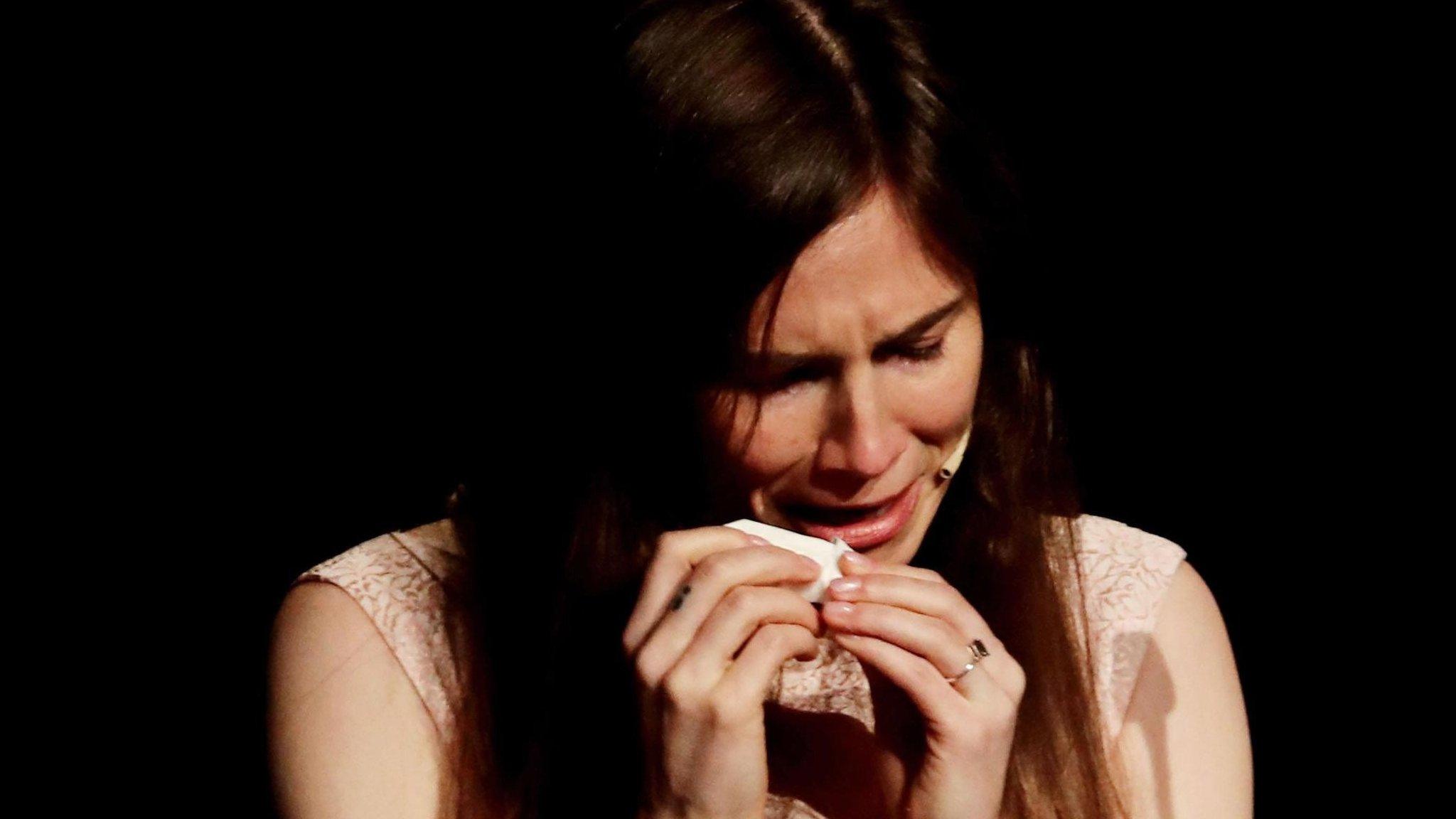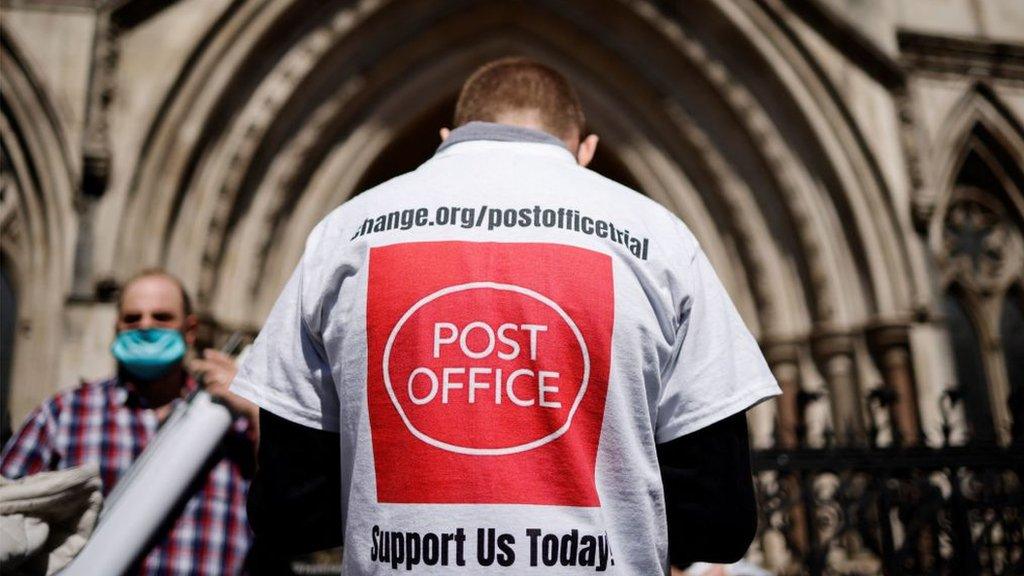Raphael Rowe: 'You can't repair the damage if you're falsely accused'
- Published
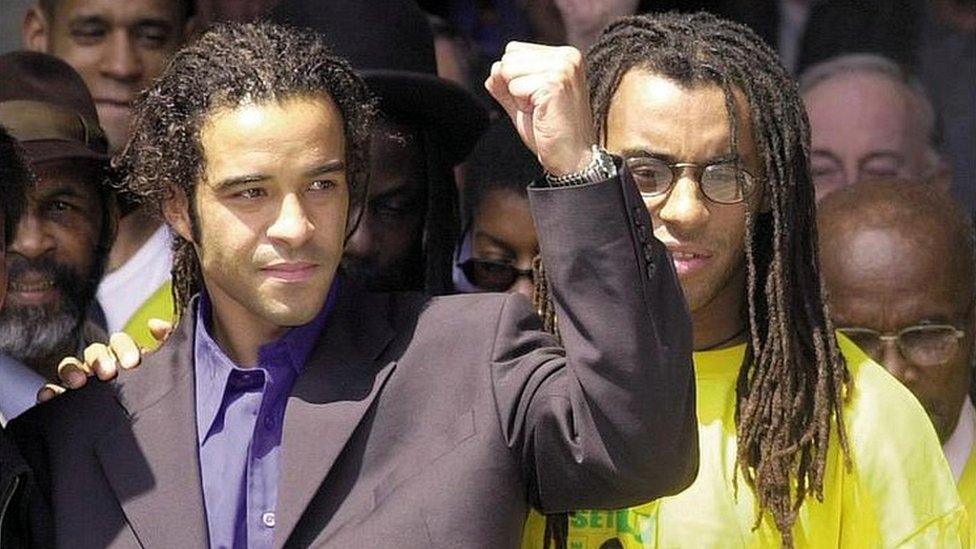
Raphael Rowe (left) and Michael Davis (right), along with Randolph Johnson, were known as the M25 Three
In July 2000, Raphael Rowe walked free from a prison system he had first been told he would never leave.
"I spent 12 years in prison for a crime I didn't commit. I was destined never to be released," the journalist and presenter says.
In December 1988, three men carried out a series of attacks and robberies around the M25 motorway, external, including the brutal murder of hairdresser Peter Hurburgh who along with his partner was dragged from a car at gunpoint, tied up and beaten.
A 20-year-old Mr Rowe was arrested at his home in Sydenham, south-east London, soon after and along with Michael Davis and Randolph Johnson was sentenced to life in prison without the possibility of parole.
At the sentencing in March 1990, the judge told the trio they were all "evil and dangerous men" who had "struck terror into your victims", while the crimes of the so-called M25 Three made newspaper headlines and filled column inches.
"I was accused of being a monster, I was accused of being a murderer," explains Mr Rowe.
"I could deal with that because I knew I was innocent, but it was my family and other relatives who had to live with that stigma, had to live with that shame."
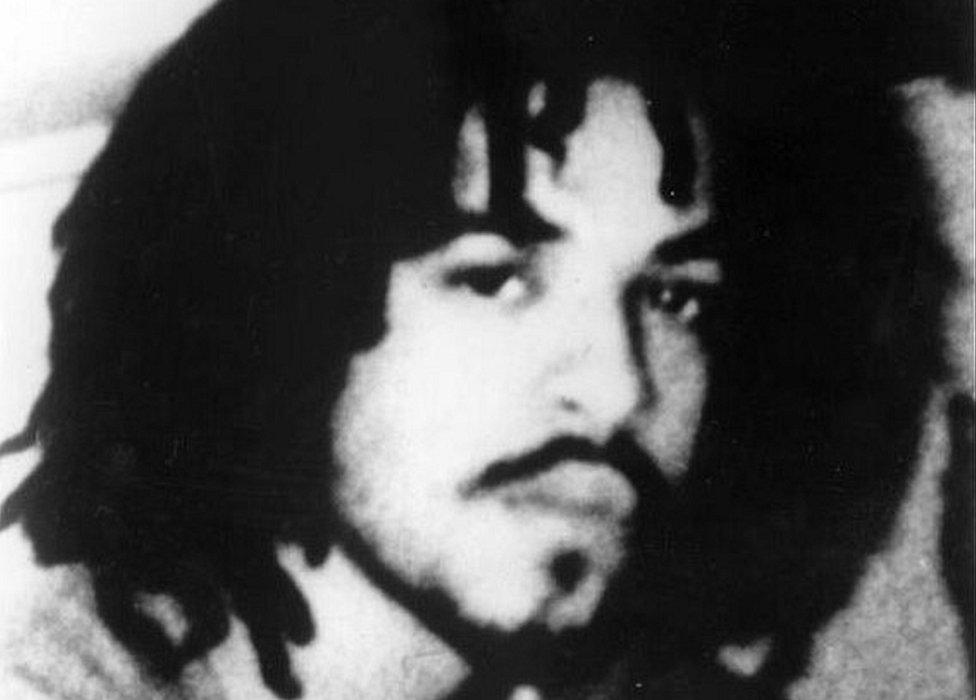
Mr Rowe grew up in Camberwell, south-east London
The case against the three men was considered controversial. Four out of five of the surviving victims of the attacks originally told police at least one of the attackers was white, while all three defendants were black. There was also no direct forensic or identification evidence that linked them to the crimes.
Even so a first appeal was turned down in 1993 before the case was looked at again four years later by the Criminal Cases Review Commission and, separately, the European Court of Human Rights ruled the three men had been denied a fair trial.
Mr Rowe then found himself back at the Court of Appeal where his conviction was finally quashed after it was revealed crucial evidence had been withheld from the original trial, external, in a similar way to the case of Andrew Malkinson, who was recently released from prison after a 20-year battle to prove he was innocent of rape.
Yet while the judges had found the trio's convictions unsafe, there was still a sting in their ruling as they added that the judgment was "not a finding of innocence, far from it", and the evidence "against all three appellants was formidable".
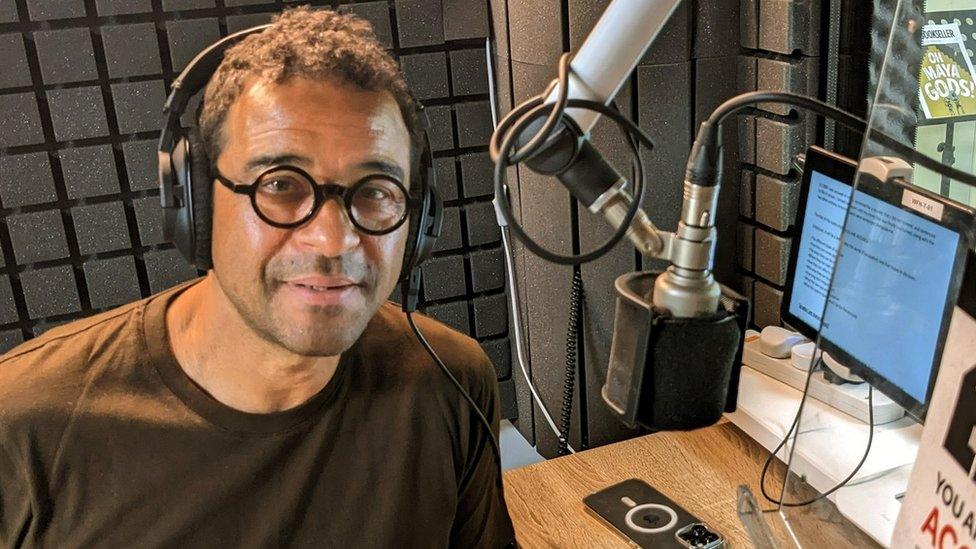
Mr Rowe trained to become a journalist while in prison and upon his release went on to be a reporter and presenter
"It's no surprise that when they overturned our convictions, they made this declaration of 'not innocent' or 'formidable evidence'. Well, if that's the case, why am I still not in prison serving a life sentence?" says Mr Rowe.
"Of course we were innocent, but they didn't want to accept that the system could allow three black men to go to prison when the perpetrators consisted of two white and one black."
While he did receive some compensation for what happened to him, the journalist says a comment like that "plants a seed" in people's minds "so it allows the stigma to remain, and it allows people that you're talking to to say 'oh, but didn't the judges say that they weren't innocent?'"
As a result Mr Rowe, who upon his release worked for BBC Radio 4's Today programme and Panorama before going on to present Netflix's Inside the World's Toughest Prisons, finds that more than two decades on he is still having to explain himself "because the damage has been done".
It is the ongoing impact of false accusations like his that Mr Rowe has used as the basis of his new audiobook.
You Are Accused sees the presenter speaking to various people who have had serious wrongful accusations made against them.
Those featured include Jo Hamilton, who was a victim of the Post Office scandal, Kylie Moore-Gilbert, an academic who was jailed in Iran for espionage, and Liam Allan, whose rape trial collapsed after detectives failed to disclose vital evidence but who Mr Rowe found to still have "that fear in him that people believed that he was guilty of something he wasn't guilty of".
"In none of the cases that I've spoken to any of the contributors did those who made that false allegation, false accusation - that ruined that individual's life for a period - get held accountable or accepted responsibility," Mr Rowe says.
"That for me was the striking thread that went through a lot of these individuals."

Amanda Knox served four years in prison for the murder of Meredith Kercher
One chapter centres on Amanda Knox, who gained worldwide notoriety when she went on trial for the murder of British student Meredith Kercher in Italy.
"Her conviction was deemed unsafe and yet there is still this stigma that 'Foxy Knoxy' Amanda Knox did do what she was imprisoned for because we don't want to accept, do we, that the criminal justice system can falsely accuse people," says Mr Rowe.
The pair also discuss the consequences of a wrongful conviction for those around them, such as how Ms Knox will at one point need to explain to her young daughter about how she was "once described as the most hideous woman on Earth".
"I had that challenge of telling my kids that I'd been wrongly imprisoned and been wrongly convicted, and it's one of the hardest things," explains Mr Rowe.
Liam Allan previously spoke to the BBC about being falsely accused of rape
As such the journalist hopes his audiobook will "give the public a general insight into the long-term consequences for the individual, their family, their relatives and the community" about what happens to people when they are falsely accused, as well as better accountability by the authorities.
"It's like you've been cut, the wound is there, and the scar will forever remain - it's not external, it's an internal scar - and it doesn't matter how much compensation you get, or how you've been able to use it, to advocate on behalf of other people... you can never ever repair that," Mr Rowe adds.
"I just think that we, as a society, need to be a bit more responsible about how we go about these things."
Raphael Rowe's audiobook You are Accused was released on 10 August

Follow BBC London on Facebook, external, Twitter , externaland Instagram, external. Send your story ideas to hellobbclondon@bbc.co.uk, external
Related topics
- Published8 August 2023
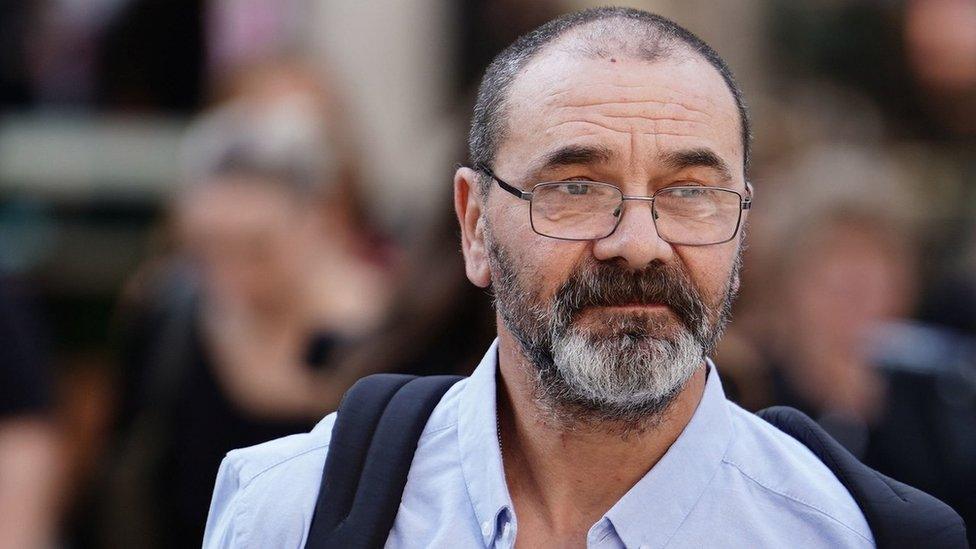
- Published7 August 2023
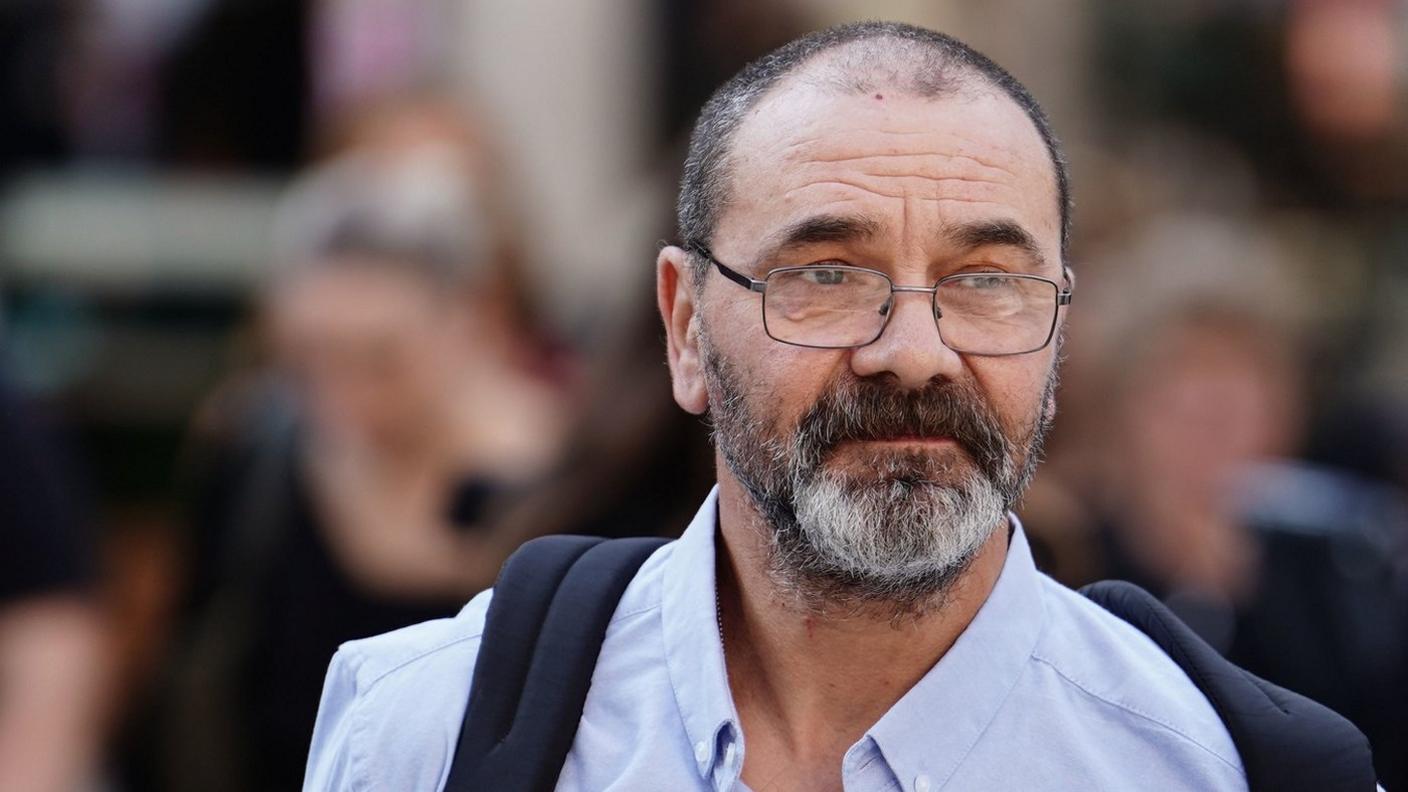
- Published15 June 2019
